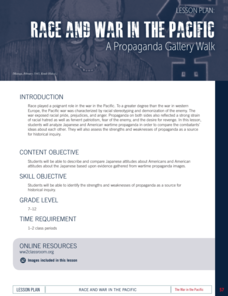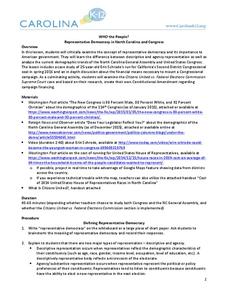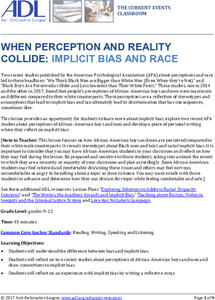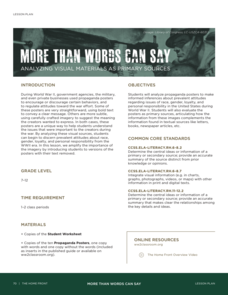PBS
Ken Burns: Jackie Robinson Integration or Separation?
What happens when change you imagined, the change you were promised, is slow in coming or doesn't happen at all? What do you do with the frustration and disenchantment? Class members watch two clips from the Ken Burns: Jackie Robinson...
K20 LEARN
Electoral College: Does My Vote Count?
How can a candidate get the most votes, yet still lose the race for the presidency? This is has happened more than once in American history, including in the elections of 2000 and 2016. Using an activity for creating group notes, young...
Curated OER
Gaining Perspective
Discuss race in the United States. Start by having each learner read a copy of Martin Luther King Jr's famous speech, "I Have a Dream." Then, have them read the article "Shared Prayers, Mixed Blessings" about a church in Atlanta,...
Curated OER
Spinelli's Maniac Magee (excerpt): Reading and Critical Thinking Practice
A brief, dialogue-rich passage from Jerry Spinelli's novel Maniac Magee is accompanied by a well-written literacy assessment tool. Thematic content lends itself to age-appropriate discussions about race relations and social justice....
National WWII Museum
Race and War in the Pacific: A Propaganda Gallery Walk
Race played a key role in the war in the Pacific during World War II. Using images from both American and Japanese sources, learners consider racial propaganda and how leaders used it to rally popular support during the conflict. After...
Alabama Department of Archives and History
Alabama's 1901 Constitution: What Was at Stake?
Who should be able to vote? As part of a study of the 1901 Alabama Constitution, class members examine primary source document that reveal the reasons the authors gave to support their positions on this question and their assumptions in...
Curated OER
The Cold War (1945-1991): An Ideological Struggle
Covering the main topics of the Cold War, including some excellent discussion points on the methodologies of the Soviet and Eastern Bloc nations versus the US and Western Democracies, this presentation is a good way to introduce the...
Carolina K-12
Who the People? Representative Democracy in North Carolina and Congress
Our elected officials are supposed to represent us, but what does it mean when they aren't like us? Budding citizens explore the demographic makeup of the US Congress, the role of money in political elections, and the Citizens United...
Museum of Tolerance
Documents That Shape Society
The Bill of Rights is a foundational document of American democracy, much like the Nuremberg Laws were a foundational document of the Reichstag of Nazi Germany. But that's where their similarities end. Engage high schoolers in a...
Anti-Defamation League
When Perception and Reality Collide: Implicit Bias and Race
The big idea in this lesson is that implicit bias often clouds perceptions. High schoolers watch a short video, read research articles, and engage in discussions about implicit bias and how these biases lead to stereotyping. They craft...
Curated OER
Students Speak Out: A Discussion Activity
Students read a collection of student essays addressing racism and racial disparities and discuss them. In this racism lesson plan, students discuss the essays and talk about their impact.
Curated OER
Race and Voting in the Segregated South
Learners examine the history of African American voting rights. In this voting rights lesson, students listen to a lecture on African American voting rights between the years 1890 and 1965. Learners respond to discussion questions...
Curated OER
Race and Representation
Young scholars consider race and representation. In this voting rights lesson, students listen to their instructor lecture on the Voting Rights Act of 1965, Georgia congressional districts, and North Carolina voting districts. Young...
School Specialty
The Tortoise and the Hare - Drawing Conclusions/Predictions Outcomes
Does the fastest one always win the race? Look deeper into The Tortoise and the Hare with a set of discussion questions for before, during, and after reading the story.
University of California
Was Slavery Always Racial?
The lesson focuses on slavery in the ancient world and asks academics to decide if it was always about race. Scholars view primary sources, participate in a short discussion, and complete a worksheet to understand how slavery in the...
Illustrative Mathematics
Election Poll, Variation 1
Your class will learn what it means to take a random sample of a population and to draw inferences from the information gained. In part a, of the exercise, you discuss with your class how students during a class election can be best...
Lied Center of Kansas
The Ugly Duckling and The Tortoise and the Hare
Both The Ugly Duckling and The Tortoise and the Hare are great additions to an elementary language arts lesson. Young readers focus on the literary elements of each story, including characters and plot development, and apply counting and...
National Park Service
Making Choices
What factors go into a decision to enter a war? Use a collection of primary source documents and images to prompt a discussion about the American Revolution and the reasons for entering a war against Britain.
PBS
Out of the Shadows | Black America Since MLK: And Still I Rise
Two powerful video clips launch a study of race relations in the United States after the Selma, Alabama riots, the passage of the Votings Rights Act, and the riots in Watts, California.
Stanford University
Chinese Immigration and Exclusion
The Chinese Exclusion Act was the first race-based restriction on immigration in American history. Why was the act passed after Chinese immigrants helped build the Transcontinental Railroad? A series of documents, including speeches and...
Equality and Human Rights Commission
Diversity
Eighty-seven percent of people living in the United Kingdom identify as white, and some of those struggle to understand the importance of diversity in society. Scholars use presentations, discussions, and activities to address diversity...
Novelinks
Maniac Magee: Discussion Questions
Why did they say that? What did they mean? How did they feel? Using the six levels of Bloom's Taxonomy, challenge your young readers to answer the comprehension questions about chapters 41 and 42 of Maniac Magee by Jerry Spinelli. Each...
National WWII Museum
More Than Words Can Say: Analyzing Visual Materials as Primary Sources
The propaganda of World War II was a key factor in galvanizing the home front. Class members examine images—without their text—to consider their messages, including those around race and gender. Using pictures and discussion questions,...
Captain Planet Foundation
Solar Cooking Race
Study heat transfer with activities that focus on how heat energy works. Using a solar cooker, ice cubes, and heat transfer bracelets, kids experiment and record what they find by keeping ice cubes cold and vegetables hot.

























